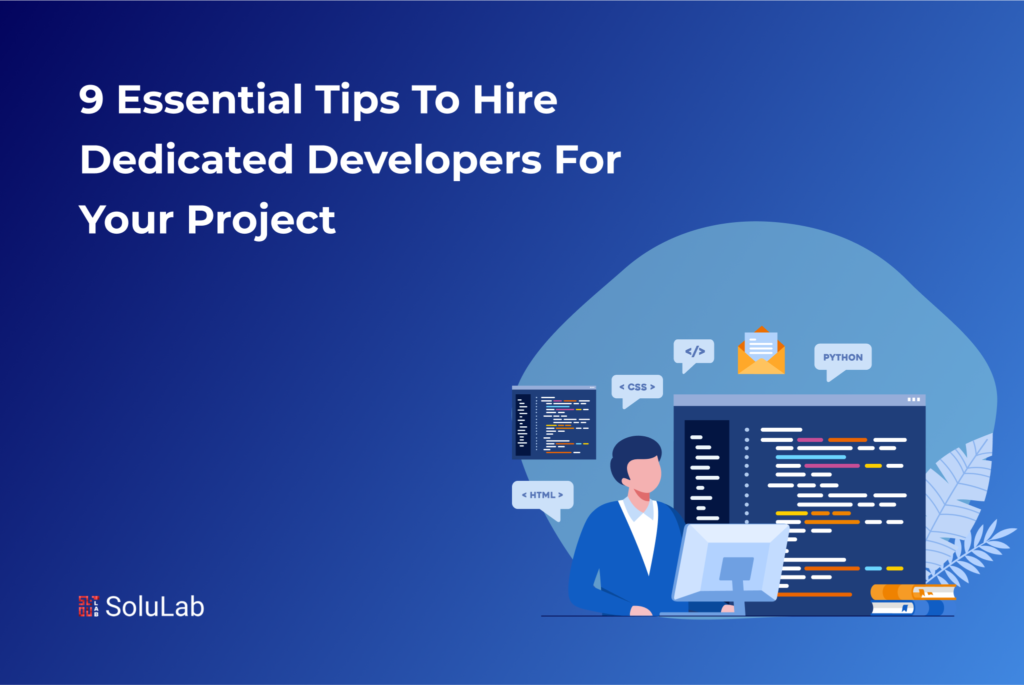
In today’s competitive digital landscape, hiring dedicated developers is a strategic move to ensure the success of your software development project. Whether you’re a startup with limited resources or an established company looking to expand your development team, finding and hiring the top dedicated developers can be daunting. Using an AI recruitment software can simplify this process by helping you identify, screen, and connect with the most suitable candidates efficiently.
This article provides ten essential tips to guide you through the process and help you make informed decisions. By following these guidelines, you can increase the chances of finding top-notch talent that aligns with your project requirements and contributes to its overall success.
1. Clearly Define Your Project Requirements
To start the hiring process and hire a developer for a project on the right foot, it’s crucial to have a clear understanding of your project requirements. Clearly define the scope of your project, including specific functionalities and features you expect to be delivered. This clarity will attract dedicated developers with experience in similar projects and can effectively meet your expectations. Outline the technology stack and frameworks utilized in the development process, ensuring the developers you hire have the required expertise. Set realistic and achievable timelines, considering any potential dependencies or external factors impacting the project.
How to Clearly Define Your Project Requirements
- Start by clearly defining your project’s scope, functionalities, and features. This ensures that developers clearly understand what needs to be delivered.
- Outline the technology stack and frameworks you’ll be using. This helps attract developers with the necessary expertise in the required technologies.
- Set realistic and achievable timelines, considering any potential dependencies or external factors. This helps manage expectations and ensures efficient project planning.
Benefits: Clearly defining your project requirements helps attract developers who understand your project’s scope and can deliver the desired results. It minimizes misunderstandings, reduces rework, and increases project efficiency.
2. Determine Your Budget and Project Duration
Before embarking on the hiring journey, it’s essential to determine your budget and project duration. Assess your financial resources and allocate a budget that covers the developer’s fees and accounts for any additional expenses, such as software licenses or infrastructure requirements. A well-defined budget ensures you can attract and retain dedicated developers who fit your financial constraints.
Consider the project duration and factor in any potential delays or changes that may arise during the development process. Setting realistic timelines allows you to effectively plan and manage the project, minimizing the risk of time and cost overruns. Regularly review and reassess your budget and project duration to ensure you have sufficient resources to support the dedicated developers throughout the project lifecycle.
How to Determine Your Budget and Project Duration
- Assess your financial resources and allocate a budget that covers developer fees, additional expenses, and contingencies. This helps ensure you have sufficient resources to support the project.
- Consider the project duration and factor in potential delays or changes. This helps in realistic project planning and timeline management.
- Regularly review and reassess your budget and project duration to accommodate changes or evolving requirements.
Benefits: Determining your budget and project duration allows you to allocate resources effectively and make informed decisions. It ensures financial stability, minimizes project delays, and enables efficient project management.
3. Choose the Right Hiring Model
There are different hiring models to consider when bringing dedicated developers on board. You can opt for freelancers, in-house developers, or remote dedicated teams. Each model has its own set of pros and cons. Freelancers offer flexibility and cost-effectiveness but may lack dedicated teams’ long-term commitment and stability. In-house developers provide direct control and collaboration opportunities but can be costly to recruit and manage. Remote dedicated teams, often provided by software development agencies, offer a balance of expertise, cost efficiency, and flexibility. Assess the advantages and disadvantages of each model based on your project requirements, budget, and long-term goals. By choosing the right hiring model, you can ensure that you have the right resources in place to drive your project forward.
How to Choose the Right Hiring Model
- Evaluate hiring models such as freelancers, in-house developers, or remote dedicated teams. Consider their pros and cons based on your project requirements.
- Assess cost-effectiveness, long-term commitment, control, and flexibility when selecting the hiring model.
- Choose a hiring model that aligns with your project’s needs, budget, and long-term goals.
Benefits: Choosing the right hiring model ensures you have the right resources to drive your project forward. It maximizes cost-effectiveness, provides access to specialized talent, and offers flexibility based on your project’s needs.
Read Our Blog Post: Top 10 Companies to Hire Dedicated Developers
4. Look for Relevant Experience and Skill Sets
When you hire dedicated software developers, assessing their experience and skill sets is crucial. Look for developers with experience working on projects similar to yours or expertise in technologies relevant to your requirements. This relevant experience ensures that the developers you hire can hit the ground running and quickly adapt to your project’s needs. Evaluate their proficiency in programming languages, frameworks, and tools necessary for your project’s success. Consider conducting technical assessments or coding challenges to gauge their abilities and verify their claimed expertise. Assessing experience and skill sets ensures you hire developers with the necessary knowledge and skills to contribute effectively to your project.
How to Look for Relevant Experience and Skill Sets
- Seek developers with experience in projects similar to yours or expertise in relevant technologies. This ensures they can handle your project effectively.
- Assess their proficiency in programming languages, frameworks, and tools required for your project’s success.
- Conduct technical assessments or coding challenges to evaluate their abilities.
Benefits: Hiring developers with relevant experience and skill sets ensures they can quickly adapt to your project’s requirements. It reduces the learning curve, enhances productivity, and increases the quality of deliverables.
5. Assess Communication and Collaboration Skills
Effective communication and collaboration are paramount for successful project execution. When you hire dedicated resources, evaluate their verbal and written communication skills. Look for developers who can articulate their ideas, actively listen to others, and effectively convey information. Strong communication skills foster a collaborative environment and help prevent miscommunications or misunderstandings. Consider their collaboration skills and adaptability to your project’s workflow and communication tools. Assess how well they can integrate into your existing development team or work seamlessly with other team members, in-person or remotely. Effective communication and collaboration enhance productivity and foster a positive working environment.
How to Assess Communication and Collaboration Skills
- Evaluate candidates’ verbal and written communication skills during the hiring process.
- Consider their ability to articulate ideas, actively listen, and adapt to your project’s communication tools and workflow.
- Assess their collaboration skills and how well they can integrate into your existing development team.
Benefits: Assessing communication and collaboration skills ensure effective teamwork, seamless project coordination, and a positive work environment. It promotes clear communication, minimizes misunderstandings, and enhances overall project success.
Check Out Our Article: SoluLab Honored By GoodFirms as the Winner of the Trusted Choice Award 2023
6. Evaluate the Developer’s Portfolio and References
Requesting a developer’s portfolio and checking references can provide valuable insights into past projects and client satisfaction. Review their previous work to assess the quality of their code, problem-solving abilities, and overall project delivery. Look for developers who have worked on projects similar to yours or have demonstrated versatility in handling different projects. This diversity of experience indicates their ability to adapt to different project requirements and challenges. Reach out to their references to gain additional perspective on their work ethic, professionalism, and ability to meet deadlines. A developer’s portfolio and references prove their past achievements and can help you gauge their potential contributions to your project.
How to Evaluate the Developer’s Portfolio and References
- Request a developer’s portfolio to assess the quality of their past projects, code, and problem-solving abilities.
- Check references to gain insights into their work ethic, professionalism, and ability to meet deadlines.
- Evaluate their versatility in handling different projects to determine their adaptability.
Benefits: Evaluating a developer’s portfolio and references provides evidence of their past achievements and client satisfaction. It helps gauge their capabilities, reliability, and potential contributions to your project.
7. Consider Cultural Fit
While technical skills are crucial, the cultural fit should not be overlooked. Hire best-dedicated developers who align with your company’s values and work culture and can lead to better collaboration and synergy within the team. Assess their ability to adapt to your organization’s work environment and values, ensuring a harmonious integration into your development team. Look for developers who have the necessary technical skills and share a similar work ethic and mindset. Cultural fit ensures that the dedicated developers will be competent in their roles and contribute positively to the team dynamics and overall project atmosphere.
How to Consider Cultural Fit
- Assess how well a developer aligns with your company’s values, work environment, and team dynamics.
- Look for developers who share a common vision and work ethic.
- Ensure they can integrate harmoniously into your existing team.
Benefits: Considering cultural fit ensures a cohesive team dynamic, better collaboration, and increased productivity. It fosters a positive work culture and reduces conflicts, leading to a more successful project outcome.
Read Also: Hire a Solidity Developer – Everything You Need to Know
8. Utilize Online Job Platforms and Professional Networks
Leverage online job platforms such as LinkedIn, Stack Overflow, or specialized developer communities to connect with a vast pool of talented developers. These platforms allow you to reach a wider audience and attract developers who are actively seeking new opportunities. Create detailed job listings that highlight your project requirements, company vision, and what you offer as an employer. Provide clear and concise information to pique the interest of potential candidates and ensure that they have a solid understanding of your project’s scope and expectations. Actively participate in relevant developer forums or attend industry conferences to network with potential candidates. Building connections and leveraging professional networks increases your chances of finding highly skilled dedicated developers who can add value to your project.
How to Utilize Online Job Platforms and Professional Networks
- Leverage online job platforms like LinkedIn and Stack Overflow to connect with talented developers.
- Create detailed job listings highlighting your project requirements, company vision, and what you offer as an employer.
- Participate in relevant developer forums and conferences to network with potential candidates.
Benefits: Utilizing online job platforms and professional networks expands your talent pool, increases visibility, and attracts developers actively seeking new opportunities. It enhances your chances of finding highly skilled dedicated developers.
9. Conduct Comprehensive Interviews and Technical Assessments
Interviews and technical assessments play a crucial role in the hiring process. Prepare comprehensive interview questions assessing the candidate’s technical knowledge, problem-solving abilities, and approach to various scenarios. The interview process provides an opportunity to evaluate the candidate’s communication skills, interpersonal abilities, and overall fit with your team. Consider conducting technical assessments or coding challenges to evaluate the candidate’s coding skills and problem-solving capabilities. These assessments provide practical insights into how the developer thinks and approaches real-world scenarios. A thorough interview process allows you to assess the candidate’s fit for your project, ability to work under pressure, and problem-solving capabilities.
How to Conduct Comprehensive Interviews and Technical Assessments
- Prepare comprehensive interview questions to assess technical knowledge, problem-solving abilities, and their approach to various scenarios.
- Consider conducting technical assessments or coding challenges to evaluate their coding skills.
- Evaluate communication skills, adaptability, and problem-solving capabilities during interviews.
Benefits
Comprehensive interviews and technical assessments help you assess the candidate’s fit for your project, ability to work under pressure, and problem-solving capabilities. It ensures you make informed hiring decisions and selects the best candidates for your project.
Conclusion
In conclusion, hiring dedicated developers for your project requires careful planning and consideration. Following the ten essential tips discussed in this article, you can navigate the hiring process more effectively.
Clearly defining your project requirements, determining your budget and duration, and choosing the right hiring model are foundational steps. Additionally, evaluating experience and skill sets, assessing communication and collaboration skills, and considering cultural fit are crucial for finding the right dedicated developers.
Leveraging online job platforms and professional networks, conducting comprehensive interviews and technical assessments, and checking portfolios and references further enhance your chances of hiring top talent.
Remember, the success of your project heavily relies on the expertise and dedication of your development team, so invest time and effort in the hiring process to make informed decisions and set your project up for success.
By implementing these tips, you can improve your chances of hiring top dedicated developers who possess the technical skills required for your project, fit well within your team dynamics, and share your vision for success.
Hiring a proficient and committed team of dedicated developers is a strategic move to bring your business idea to life and enhance your development capabilities. By hiring the best-dedicated developers and programmers from SoluLab who are driven by a strong passion to elevate your business endeavors, your organization can exceed the highest standards of quality. Collaborating with SoluLab, you can transform aspirations into tangible achievements, fueling success and propelling growth to new horizons. Contact SoluLab today to explore the possibilities.
FAQs
1. How can I clearly define my project requirements when hiring dedicated developers?
To clearly define your project requirements, start by outlining the scope, functionalities, and features. Additionally, specify the technology stack and frameworks you’ll be using. It’s crucial to set realistic timelines considering potential dependencies. These steps attract developers with relevant experience, ensure a common understanding, and streamline the hiring process.
2. Why is determining my budget and project duration important before hiring dedicated developers?
Determining your budget allows you to allocate resources effectively and attract developers who fit your financial constraints. Considering the project duration helps in a realistic planning and minimizes the risk of time and cost overruns. Regularly reviewing your budget and project duration ensures sufficient resources throughout the project’s lifecycle.
3. What factors should I consider when choosing the right hiring model for dedicated developers?
When selecting a hiring model, evaluate freelancers, in-house developers, and remote dedicated teams. Consider factors such as cost-effectiveness, long-term commitment, control, and flexibility. Choose a model that aligns with your project’s needs, budget, and long-term goals to ensure the right resources are in place.
4. How can I assess the experience and skill sets of dedicated developers?
Assessing experience and skill sets involves seeking developers with relevant experience in similar projects or expertise in relevant technologies. Evaluate their proficiency in programming languages, frameworks, and tools required for your project’s success. Consider conducting technical assessments or coding challenges to gauge their abilities and ensure a good match.






